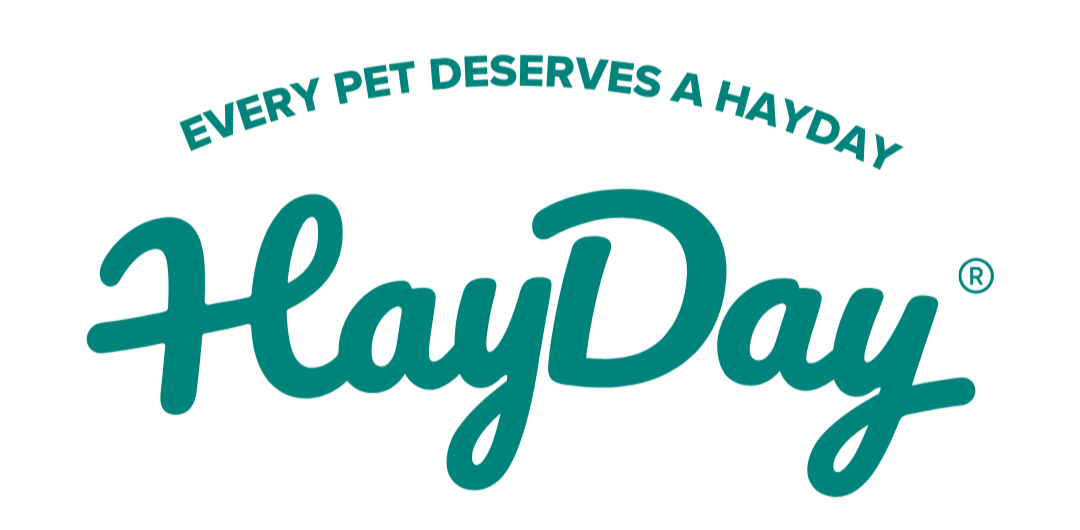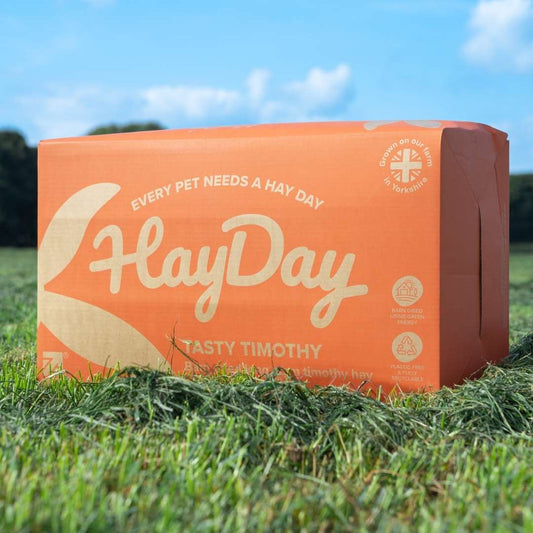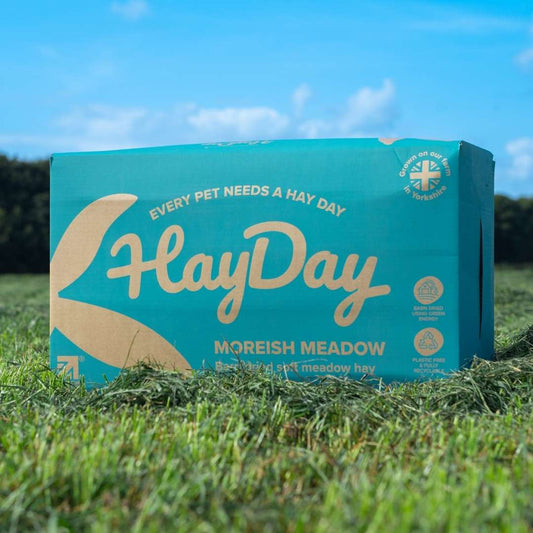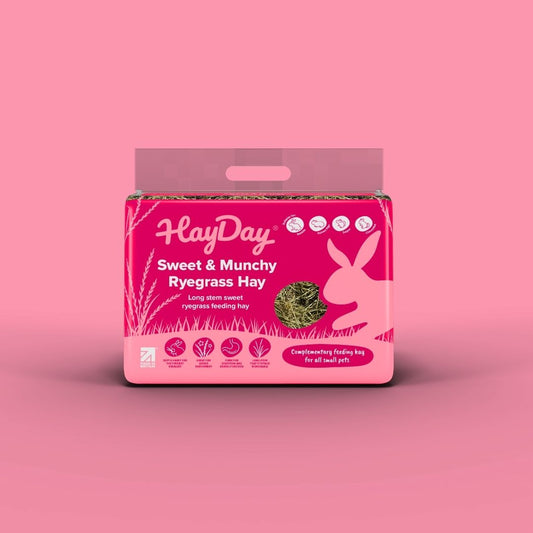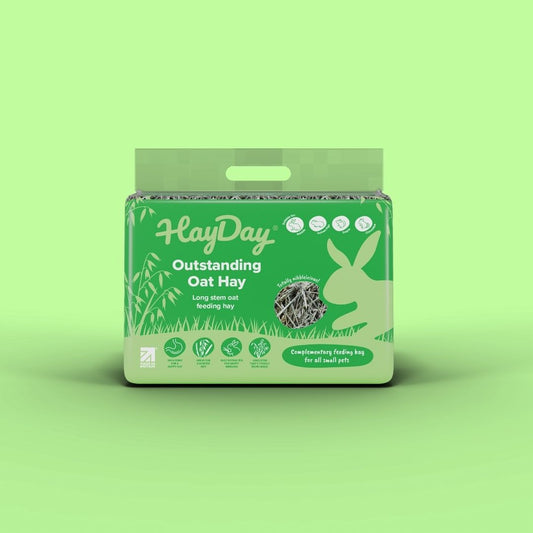If you’re questioning whether rabbits can eat tomatoes, the simple answer is yes - but with caution.
Yes, tomatoes can be a tasty treat for your bunny but knowing how and how much to feed them is key. This guide will walk you through the essentials of including tomatoes in your rabbit’s diet without risk.
Want to give your bunnies something highly nutritious and super safe to eat? Check out our barn dried hay - Click here >

Feeding Tomatoes to Rabbits - Overview
-
Rabbits can safely eat tomatoes in moderation, benefiting from their vitamins, minerals, antioxidants, and fibre. Only allow them to consume the fruit, excluding leaves, stems, and seeds (to avoid toxicity).
-
Tomatoes should be thoroughly washed to remove pesticides and only served in small quantities, no more than once or twice a week.
-
A balanced diet mainly consists of rabbit hay, rabbit pellets and leafy greens. New foods should be introduced slowly, over a period of 7 to 14 days, monitoring for any health changes.
Shop best quality Timothy hay here >
Tomato Treats: Nutritional Benefits for Rabbits
If you’ve ever wondered if rabbits can eat tomatoes, the answer is “yes rabbits can eat them!"
But just like any food, it’s all about balance and moderation.
Why, you ask? Well, let’s dive into the nutritional composition of tomato's to find out.
Vitamins and Minerals
Your small animal can derive significant benefits from the vitamins and minerals packed in tomatoes. For instance, Vitamin A, which promotes clear eyesight and supports various bodily functions, is a key component of these red fruits.
They also serve as a source of Vitamin C, instrumental in tissue development, repair, and growth.
The potassium found in tomatoes not only boosts a rabbit’s potassium intake but also contributes to their overall health.
Antioxidants and Lycopene
What makes tomatoes even more beneficial for your pet rabbit is the presence of antioxidants, specifically, lycopene.
These elements contribute significantly to safeguarding a rabbit’s heart from damage and enhancing their overall heart health.
Fibre Content
Another significant nutrient that tomatoes offer your bunny is fibre. An average-sized tomato contains approximately 1.5 grams of fibre, mostly insoluble, which plays a pivotal role in maintaining your rabbit’s digestive health.
It ensures regular bowel movements and prevents gastrointestinal issues, contributing to their overall well-being when they munch on this treat.
Timothy Hay and Meadow Hay is a great source of high fibre for your small pet. If you're unsure of which to try first, why not try one of out 50/50 Timothy and Meadow Hay Taster Packs > Click here.
Preparing Tomatoes for Your Rabbit
The process of feeding your rabbit tomatoes involves more than just plucking one from the plant or buying them from your local supermarket.
As with any food, certain steps are necessary to guarantee that this treat is safe for your small animal. Here’s a closer look at the steps to follow, to ensure tomatoes are rabbit safe.
Removing Toxic Parts
In the preparation of tomatoes for your bunny, eliminating any toxic parts; such as leaves, stems, and seeds of a tomato plant is so important.
Before feeding, identify the dark, unripe sections of the tomato fruit and remove them, along with any stems or larger tomato leaves, by bending them back until they snap off the main stem. Green tomatoes should also be avoided.
Also, ensure to remove any tomato seeds present in the fruit.
Washing and Pesticide Considerations
With all the harmful parts eliminated, the next step is to wash the tomato. This will ensure the removal of any pesticides.
Serving Size and Frequency
Now that your tomato is ready, it’s time to serve it to your furry friend. But how much is too much?
To prevent digestive issues, it is recommended to feed a rabbit a small piece or a few slices of tomato no more than once or twice a week.
By serving tomatoes in moderation as part of a healthy diet, you can avoid any potential health or digestion issues and ensure a happy and healthy bunny, for life.
Alternative Fruits and Vegetables for Rabbits
Though tomatoes make a great occasional treat, offering your rabbit a variety of fruits and vegetables is key to a balanced diet. Rabbit-friendly alternatives include:
-
Cabbage to be served in moderation
You can see the full list of rabbit safe fruit and vegetables, available on the PDSA website.
Monitoring Your Rabbit's Health
There are many human foods suitable for rabbits, but closely monitoring your rabbit’s health is necessary whenever you introduce a new food to their diet.
This includes being vigilant to any changes in their behavior or eating pattern, and watching out for signs of discomfort. Especially within the first 24 hours after introducing any new foods or changes to their diet.
Ensuring a Balanced Diet for Your Rabbit
Despite tomatoes being a delightful treat for your bunny, they should not constitute the main portion of their diet. For optimal health, a balanced diet comprising 80-85% hay such as our Timothy hay, pellets, leafy greens and water is essential.
To shop premium, barn dried hay for your small pet > Click here.
Fruits and Vegetables as Treats
Approximately 5-10% of a rabbit’s diet should be leafy greens and vegetables, with a daily serving of an adult-sized handful of safe, washed leafy green vegetables and herbs.
Rabbits eat these nutritious items, but keep in mind, due to their high sugar content, fruits should be served sparingly as occasional treats.
Always beware unsafe foods for rabbits too to keep your rabbit fit and healthy.
Summary
After exploring the nutritional benefits and preparation process of feeding tomatoes to your rabbit, it’s clear that these red fruits can be an optional, healthy treat for your furry friend when served in moderation.
Aside from tomatoes, other fruits and vegetables also provide essential nutrients and can diversify your rabbit’s diet.
Wanting to feed hay which is great for your small pet's digestive and dental health > Click here for high quality hay.
Frequently Asked Questions
Can rabbits eat lettuce and tomato?
Yes, rabbits can eat some types of lettuce, but they should avoid iceberg lettuce because it contains lactucarium which can be harmful in large quantities. Dark leafy greens are best.
What vegetables can rabbits eat?
Rabbits can eat a variety of vegetables including dark, leafy greens like kale, parsley, and mint, as well as other vegetables like bell peppers and cucumbers. We would always recommend introducing new types of greens gradually, over a period of 7 to 14 days, to avoid any gut or digestion issues.
Can rabbits eat banana?
Yes, rabbits can eat bananas, but it's important to give them in moderation as they are high in sugar. Like all fruits, a small slice given occasionally can be a safe treat for your bunny.
What parts of the tomato are harmful to rabbits?
The tomato leaves, stems, and seeds can be harmful to rabbits and therefore should be removed before feeding them to your small pet.
